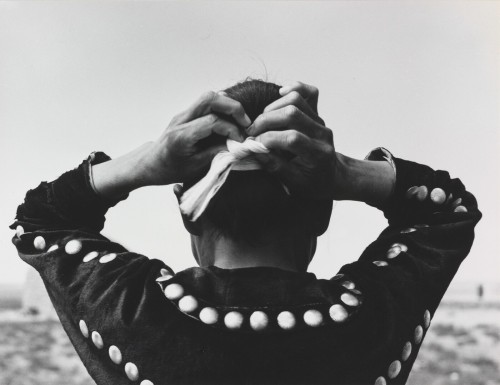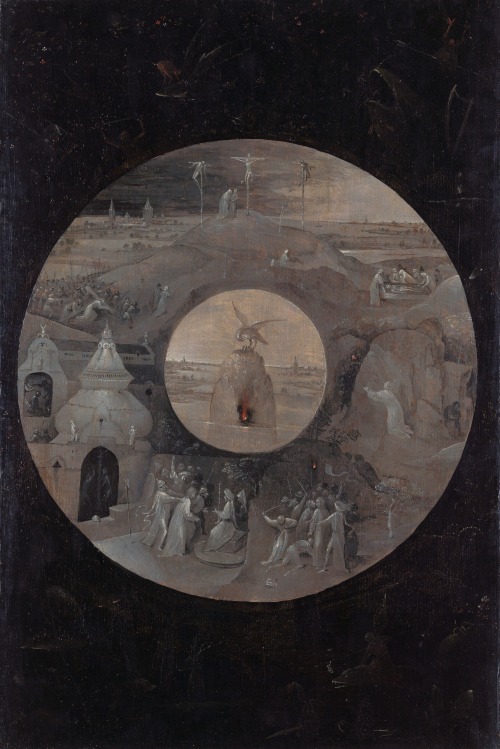Laura Gilpin. Tying A Chongo, 1954.

Laura Gilpin. Tying a Chongo, 1954.
More Posts from Raskopal and Others

Botanical Study N° 4 | Fawn DeViney
Forough Farrokhzad - To my sister
Sister, rise up after your freedom, why are you quiet? rise up because henceforth you have to imbibe the blood of tyrannical men.
Seek your rights, Sister, from those who keep you weak, from those whose myriad tricks and schemes keep you seated in a corner of the house.
How long will you be the object of pleasure In the harem of men’s lust? how long will you bow your proud head at his feet like a benighted servant?
How long for the sake of a morsel of bread, will you keep becoming an aged haji’s temporary wife, seeing second and third rival wives. oppression and cruelty, my sister, for how long?
This angry moan of yours must surely become a clamorous scream. you must tear apart this heavy bond so that your life might be free.
Rise up and uproot the roots of oppression. give comfort to your bleeding heart. for the sake of your freedom, strive to change the law, rise up.

Shadow, Osaka, Photo by Daido Moniyama, 1995

Hieronymus Bosch - Scenes from the Passion of Christ, Reverse of Painting “Saint John the Evangelist”. 1489



Black Girl (1966)









Passion / باب المقام / Bab al-Makam (2005) dir. Mohammad Malas
Cinematography by Tarek Ben Abdallah

Girls in the garden at “Orphan City,” an enormous orphan refugee camp of more than 30,000 children managed by Near East Relief in Alexandropol (modern Gyumri, formerly Leninakan), Armenia, circa 1920.
EVA FERRI: You insist on the centrality of the writing, you called it a chain that pulls up water from the bottom of a well. What are the features of your approach to writing?
ELENA FERRANTE: I work well when I can start from a flat, dry tone, that of a strong, lucid, educated woman, like the middle-class women who are our contemporaries. At the beginning I need curtness, terse, clear formulas that are free of affectations and demonstrations of beautiful form. Only when the story begins to emerge with assurance, thanks to that initial tone, do I begin to wait with trepidation for the moment when I will be able to replace the series of well oiled, noiseless links with a rusty, rasping series of links and a pace that is disjointed, agitated, increasing the risk of absolute collapse. The moment I change register for the first time is both exciting and anguished. I very much enjoy breaking through my character’s armor of good education and good manners, upsetting the image she has of herself, undermining her determination, and revealing another, rougher soul; I make her raucous, perhaps crude. I work hard to make the fracture between the two tonalities surprising and also to make the re-entry into the tranquil narration happen naturally. While the fracture comes easily—I wait for that moment, and slip inside it with satisfaction—I very much fear the moment when the narrative has to compose itself again. I’m afraid that the narrating “I” won’t be able to calm down. But above all, now the readers know her calm is false, that is won’t last, that the narrative orderliness will break up again.
— Elena Ferrante, Frantumaglia, 2016
-
 justanothercatastrophe liked this · 2 months ago
justanothercatastrophe liked this · 2 months ago -
 mavismccloud reblogged this · 2 months ago
mavismccloud reblogged this · 2 months ago -
 bloodspatterguy liked this · 2 months ago
bloodspatterguy liked this · 2 months ago -
 cahokiajazz liked this · 2 months ago
cahokiajazz liked this · 2 months ago -
 bison-appreciation-club liked this · 2 months ago
bison-appreciation-club liked this · 2 months ago -
 cowboycactus reblogged this · 2 months ago
cowboycactus reblogged this · 2 months ago -
 subtlesolitude-tailoredtaste reblogged this · 3 months ago
subtlesolitude-tailoredtaste reblogged this · 3 months ago -
 fauxdiversion reblogged this · 3 months ago
fauxdiversion reblogged this · 3 months ago -
 treesandspoons-blog liked this · 5 months ago
treesandspoons-blog liked this · 5 months ago -
 imaperfectpieceofass liked this · 6 months ago
imaperfectpieceofass liked this · 6 months ago -
 downtothemarrow liked this · 6 months ago
downtothemarrow liked this · 6 months ago -
 permanently-changing reblogged this · 6 months ago
permanently-changing reblogged this · 6 months ago -
 ncdixiegent reblogged this · 6 months ago
ncdixiegent reblogged this · 6 months ago -
 britinthepnw reblogged this · 6 months ago
britinthepnw reblogged this · 6 months ago -
 gromae liked this · 7 months ago
gromae liked this · 7 months ago -
 farmwitch liked this · 7 months ago
farmwitch liked this · 7 months ago -
 gemini-s1ut reblogged this · 1 year ago
gemini-s1ut reblogged this · 1 year ago -
 4tupac liked this · 1 year ago
4tupac liked this · 1 year ago -
 cunagussos reblogged this · 1 year ago
cunagussos reblogged this · 1 year ago -
 royal319majesty-blog liked this · 1 year ago
royal319majesty-blog liked this · 1 year ago -
 un07ser liked this · 1 year ago
un07ser liked this · 1 year ago -
 themaster2007-blog liked this · 1 year ago
themaster2007-blog liked this · 1 year ago -
 waldfeerosisblog liked this · 1 year ago
waldfeerosisblog liked this · 1 year ago -
 axshadows liked this · 1 year ago
axshadows liked this · 1 year ago -
 shamansbluezz reblogged this · 1 year ago
shamansbluezz reblogged this · 1 year ago -
 shamansbluezz liked this · 1 year ago
shamansbluezz liked this · 1 year ago -
 canvas-cotton-leavesinbetween liked this · 1 year ago
canvas-cotton-leavesinbetween liked this · 1 year ago -
 cloudyskies123 liked this · 1 year ago
cloudyskies123 liked this · 1 year ago -
 niceoneventure liked this · 1 year ago
niceoneventure liked this · 1 year ago -
 geamohr liked this · 1 year ago
geamohr liked this · 1 year ago -
 slvvvg liked this · 1 year ago
slvvvg liked this · 1 year ago -
 lassodelluna liked this · 1 year ago
lassodelluna liked this · 1 year ago -
 westernspirits reblogged this · 1 year ago
westernspirits reblogged this · 1 year ago -
 farvelost reblogged this · 2 years ago
farvelost reblogged this · 2 years ago -
 kellynadeau liked this · 2 years ago
kellynadeau liked this · 2 years ago -
 poemafantasma liked this · 2 years ago
poemafantasma liked this · 2 years ago -
 nqom liked this · 2 years ago
nqom liked this · 2 years ago -
 unofficialchronicle liked this · 2 years ago
unofficialchronicle liked this · 2 years ago -
 thedubfather-f64 liked this · 2 years ago
thedubfather-f64 liked this · 2 years ago -
 ghost-album reblogged this · 2 years ago
ghost-album reblogged this · 2 years ago -
 lacalaveracatrina reblogged this · 2 years ago
lacalaveracatrina reblogged this · 2 years ago -
 arockcalledquartz liked this · 2 years ago
arockcalledquartz liked this · 2 years ago -
 peabah liked this · 2 years ago
peabah liked this · 2 years ago -
 illumeddarkness reblogged this · 2 years ago
illumeddarkness reblogged this · 2 years ago -
 br-er-rabbit liked this · 2 years ago
br-er-rabbit liked this · 2 years ago -
 februarygal reblogged this · 2 years ago
februarygal reblogged this · 2 years ago -
 werereckless liked this · 2 years ago
werereckless liked this · 2 years ago -
 heartbreakexpress liked this · 2 years ago
heartbreakexpress liked this · 2 years ago


